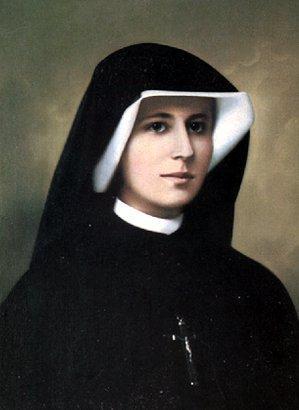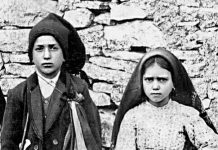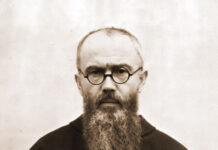On this Saturday October 5th, the Church celebrates the feast day of St Faustina Kowalska, one of great grace for me personally since I am currently attending the International Days of The Apostles of Divine Mercy, precisely from Friday 4 till Sunday 6 October at the Shrine of the Divine Mercy in Krakow Lagiewniki.
In this three-day event, we, the participants are accled to rediscover God’s merciful love in our lives, experience the mercy that always forgives, trust even more in the One who can do all things, and receive the power of the Holy Spirit to go and proclaim to the whole world that THERE IS A RESCUE – MERCY! Furthermore, these international days of the Apostles of Divine Mercy are a good opportunity to meet and interact with those who discover the path of trust and mercy as their own, and continue the mission of St. Faustina in various corners of the world.
And Jesus has brought us together around a person, his Secretary, St Faustina Kowalska. Regarding her unique role within the transmission of God’s merciful message he told her: My daughter, be at peace; do as I tell you. Your thoughts are united to My thoughts, so write whatever comes to your mind. You are the secretary of My mercy. I have chosen you for that office in this life and the next life. That is how I want it to be in spite of all the opposition they will give you. Know that My choice will not change (Diary, 1605).
As we know, St Faustina recorded the message given to her by Jesus in her Diary which bears the name Divine Mercy in My Soul. The more God gives me the grace to leaf through this precious spiritual and mystical book the more I realize how profound God’s mercy is. Moreover, I realize that God has chosen a human being to do so, with all her ups and downs in life, which is why I am interested in getting to know Sr Faustina more closely, first to appreciate her as a person and then to savour God’s powerful grace who not only worked marvels in her but also found an open and humble heart to receive it and let it do its work.
St Faustina is the one who saw Jesus who gave her the message: Jesus, I trust in you. In her Diary entry 47 she says: In the evening, when I was in my cell, I saw the Lord Jesus clothed in a white garment. One hand [was] raised in the gesture of blessing, the other was touching the garment at the breast. From beneath the garment, slightly drawn aside at the breast, there were emanating two large rays, one red, the other pale. In silence I kept my gaze fixed on the Lord; my soul was struck with awe, but also with great joy. After a while, Jesus said to me, Paint an image according to the pattern you see, with the signature: Jesus, I trust in You. I desire that this image be venerated, first in your chapel, and[then] throughout the world.
When Father Michael Sopoćko visited her for the last time, on September 26, 1938, in Krakow, she told him: My only function is that I live in the presence of my Father who is Heaven. Having said that, Faustina was human like we are, with her fears to contend with. Sometimes, like us, she found herself worrying about the future. But immediately Jesus’ permeating grace convinced her to let go of her fear and simply trust him within the present moment. Yes, trust in Jesus means living fully the present moment intensely, contemplatively and joyfully. In her Diary she writes:
When I look into the future, I am frightened, But why plunge into the future? Only the present moment is precious to me, As the future may never enter my soul at all. It is no longer in my power, To change, correct or add to the past; For neither sages nor prophets could do that. And so, what the past has embraced I must entrust to God. O present moment, you belong to me, whole and entire. I desire to use you as best I can. And although I am weak and small, You grant me the grace of your omnipotence. And so, trusting in Your mercy, I walk through life like a little child, Offering You each day this heart Burning with love for Your greater glory (Diary, 2).
Let us not forget that Sr Faustina’s religious name was Sister Maria Faustina of the Blessed Sacrament. This detail is important since it powerfully reminds us that the Eucharist is the sacrament of God’s eternal presence amongst us. In his beautiful and most inspiring encyclical on the eucharist and its relationship to the Church, Ecclesia de Eucharistia, Pope St John Paul II tells us: Consequently the gaze of the Church is constantly turned to her Lord, present in the Sacrament of the Altar, in which she discovers the full manifestation of his boundless love (no.2). Moreover, the sacramental re-presentation of Christ’s sacrifice, crowned by the resurrection, in the Mass involves a most special presence which – in the words of Paul VI – “is called ‘real’ not as a way of excluding all other types of presence as if they were ‘not real’, but because it is a presence in the fullest sense: a substantial presence whereby Christ, the God-Man, is wholly and entirely present” (no.15).
Hence, St Faustina was given the wonderful grace to live Christ’s eucharistic presence in her life in order to taste and see his boundless love for her and for all people in its fullest manifestation. Christ’s substantial eucharistic presence in her life led her to face the world’s reality with the reality of the Real One, Christ. In this perspective, amazing is her experience when he met Christ, the poor beggar who came to the convent to eat from her hands. She said:
Jesus came to the main entrance today, under the guise of a poor young man. This young man, emaciated, barefoot and bareheaded, and with his clothes in tatters, was frozen because the day was cold and rainy. He asked for something hot to eat. So I went to the kitchen, but found nothing there for the poor. But, after searching around for some time, I succeeded in finding some soup, which I reheated and into which I crumbled some bread, and I gave it to the poor young man, who ate it. As I was taking the bowl from him, he gave me to know that He was the Lord of heaven and earth. When I saw Him as He was, He vanished from my sight. When I went back in and reflected on what had happened at the gate, I heard these words in my soul:My daughter, the blessings of the poor who bless Me as they leave this gate have reached My ears. And your compassion, within the bounds of obedience, has pleased Me, and this is why I came down from My throne-to taste the fruits of your mercy (Diary, 1312).
All this shows that Faustina wisely understood that love for the poor is the prime fruit of mercy. However, is it just a matter of giving without ceasing or giving with gentleness? St Faustina gives us a great inspiration concerning this point when she says:Sometimes more is given when giving nothing, than when giving much in a rude manner (Diary, 1282).
These few entries about St Faustina give us a glimpse of what she was. I am sure that if one goes deeper and deeper into her Diary will find more autobiographical insights about her. The important thing is to take each one of them and let it speak to us and change us in the Merciful Jesus through the burning fire of continual trust.
St Faustina, pray for us.












